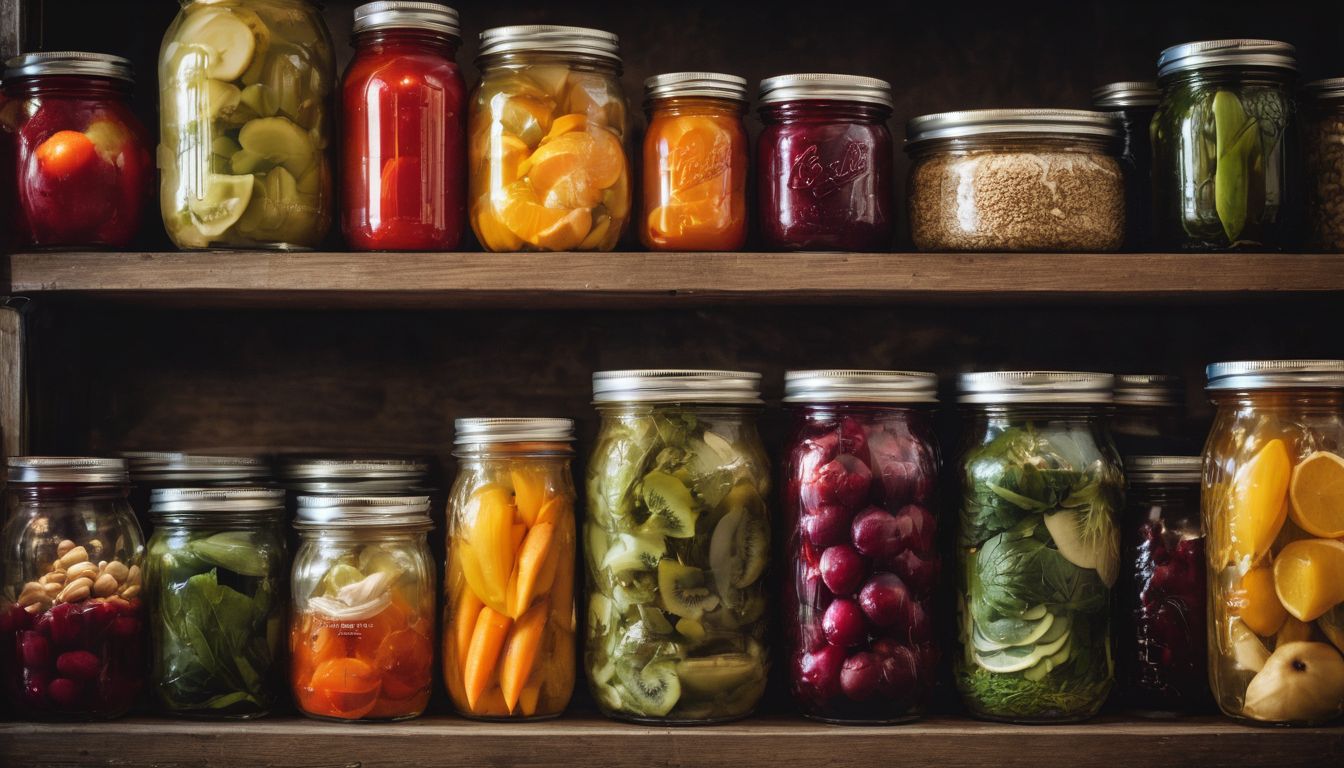As more of us try to live greener, picking the right drinks can be tricky. Did you know that not all eco-friendly wines and spirits are created equal? This article will guide you through the vineyard of choices, making it easy for you to toast to the planet’s health.
Dive in and let’s find your perfect sustainable sip!
Key Takeaways
- Look for wines and spirits with certifications such as Certified Organic, Demeter Certified Biodynamic, SIP Certified, and Lodi Rules to ensure you support environmentally friendly production practices.
- Consider trying organic, biodynamic, sustainable or vegan wines and spirits that reduce environmental impact by avoiding synthetic chemicals and promoting biodiversity.
- Choose eco – friendly alcohol options like organic spirits to enjoy drinks with fewer pesticides and additives while supporting sustainable agriculture.
- Experiment with making eco – friendly cocktails using certified organic ingredients to minimise your environmental footprint even when socialising.
- Host a sustainable wine and spirits tasting event using reusable glassware and educating guests about the importance of supporting eco-conscious brands.
Understanding the Different Types of Eco-Friendly Wines and Spirits
When it comes to eco-friendly wines and spirits, there are several options to consider, including organic wines, biodynamic wines, sustainable wines, and vegan wines. Each type has its own unique production methods that contribute to a more environmentally friendly product.
Organic Wines
Organic wines are crafted without using most synthetic pesticides or fertilisers, ensuring a minimal impact on the environment. Growers focus on natural growth and utilise organic farming practices that support soil health and biodiversity.
These wines must meet strict regulations to be certified as organic, which often includes the prohibition of genetically modified organisms (GMOs). Consumers choosing organic wine can enjoy their drink knowing they’re supporting eco-conscious vineyards that prioritise sustainability.
Makers of organic wines also tackle the issue of sulfites – compounds used to preserve freshness. While some sulfites occur naturally during fermentation, organic winemakers often add fewer artificial sulfites than conventional ones.
This approach aligns with individuals seeking low-impact wine options with potentially fewer additives. Organic spirits from these wineries offer an additional choice for environmentally conscious consumers, blending ethical production with exceptional taste profiles.
Biodynamic Wines
When transitioning from discussing organic wines to exploring biodynamic wines, it’s important to note that the principles of biodynamic winemaking go beyond organic practices. Biodynamic farming takes a holistic approach, viewing the vineyard as an interconnected ecosystem.
This method emphasises self-sufficiency and sustainability, seeking to maintain a balanced and biodiverse environment without synthetic chemicals or additives.
Biodynamic winemakers work in harmony with nature’s rhythms, following lunar and astrological cycles for planting, cultivation, and harvest. They also utilise natural composts and herbal preparations to enhance soil fertility and promote plant health.
Sustainable Wines
Sustainable wines are produced using environmentally friendly practices, minimising the use of pesticides and chemicals in vineyards. By choosing sustainable wines, you can support ethical and eco-conscious winemaking while enjoying high-quality products.
These wines often carry certifications such as Certified California Sustainable Winegrowing (CCSW) or SIP Certified, ensuring that they meet rigorous sustainability standards. Look for these labels when selecting your next bottle to make a positive impact on the environment and local communities while savouring delightful flavours.
Understanding sustainable wine production is essential for making informed choices. Next, let’s delve into the benefits of choosing eco-friendly wine and spirits aside from supporting conservation efforts – Benefits of Choosing Eco-Friendly Wine and Spirits.
Vegan Wines
Transitioning from sustainable wines to vegan wines, it’s essential to consider the impact of animal products in winemaking. Vegan wines are free from animal-derived ingredients and processing aids, making them suitable for those adhering to a plant-based lifestyle.
Winemakers use alternative fining agents such as clay or charcoal instead of traditional animal-derived substances like egg whites or gelatin, allowing environmentally conscious individuals seeking ethically sourced wine options to enjoy their favorite vintages guilt-free.
Consumers looking for eco-friendly alcohol options can confidently choose vegan wines, knowing that they align with their values of sustainability and ethical sourcing. These natural vegan wine offerings contribute positively to conservation efforts by promoting responsible agricultural practices and supporting biodiversity through gentler winemaking methods.
Benefits of Choosing Eco-Friendly Wine and Spirits
Choosing eco-friendly wine and spirits reduces environmental impact, supports local communities, and offers health benefits. For more information on the benefits of making sustainable choices, keep reading.
Reduced environmental impact
Choosing eco-friendly wine and spirits reduces environmental impact by supporting sustainable agricultural practices. This results in fewer chemicals, pesticides, and artificial additives being released into the environment.
Sustainable wineries and distilleries also prioritise energy efficiency and water conservation, contributing to a healthier planet.
Opting for eco-friendly alcohol can help preserve natural resources, protect biodiversity, and reduce carbon emissions. By selecting products with certifications such as Certified Organic or Demeter Certified Biodynamic, consumers can actively contribute to a more sustainable and environmentally conscious future.
Health benefits
Choosing eco-friendly wines and spirits offers health benefits that go beyond the glass. Organic, biodynamic, and sustainable options are free from synthetic pesticides, herbicides, and fungicides commonly found in conventionally produced alcohol.
This means lower exposure to harmful chemicals and potential allergens such as sulphites or added preservatives. Additionally, these environmentally friendly choices often contain higher levels of antioxidants and beneficial nutrients due to the organic farming methods used in their production.
Moreover, by opting for eco-conscious alcohol, you can reduce your carbon footprint while enjoying a healthier beverage. Sustainable wine and spirits support both personal well-being and environmental preservation by promoting cleaner production methods that prioritise natural ingredients without compromising on taste or quality.
Support for local communities
Choosing eco-friendly wine and spirits not only benefits your health but also gives back to local communities. Sustainable and organic vineyards prioritise fair labour practices, support local economies, and contribute to the preservation of rural landscapes.
By opting for environmentally conscious alcohol, you are directly supporting small-scale farmers and winemakers, helping them thrive in a competitive market driven by industrial production.
Investing in eco-friendly wines and spirits means investing in the well-being of local communities. The sustainable choices we make today can have a significant impact on the livelihoods of those who cultivate our favourite beverages, fostering a more equitable and environmentally friendly industry.
Richer aromas and flavors
Eco-friendly wines and spirits are known for their richer aromas and flavors, which come from the careful cultivation of grapes and other ingredients. The sustainable farming practices used in producing eco-friendly alcohol allow for a more intense expression of terroir, resulting in more complex and flavorful beverages that are a delight to the senses.
Choosing eco-friendly wine and spirits not only benefits the environment but also enhances your tasting experience, offering deeper and more vibrant flavors that truly capture the essence of the region.
Exploring different types of sustainably produced alcohol can lead to discovering new and exciting taste profiles that reflect the natural elements inherent in each sip, elevating your enjoyment while supporting environmentally conscious practices.
Certifications and Labels to Look For
When choosing eco-friendly wine and spirits, it’s important to look for certifications and labels that indicate a commitment to sustainable practices. These certifications include Certified Organic, Demeter Certified Biodynamic, and SIP Certified, among others.
Certified Organic
Look for wines and spirits that are “Certified Organic,” indicating that they’re made without synthetic pesticides, herbicides, or fertilisers. This certification ensures that the grapes used in the wine or the grains used in the spirits are grown following strict organic standards.
By choosing “Certified Organic” products, you support environmentally friendly practices and reduce your exposure to potentially harmful chemicals. Additionally, these products contribute to healthier soil and water systems while promoting sustainable farming methods.
When purchasing alcohol labelled as “Certified Organic,” you can enjoy a drink knowing it has gone through rigorous testing to meet organic standards. Not only does this benefit your health by reducing exposure to toxins, but it also supports agriculture that is kinder to the environment.
Demeter Certified Biodynamic
Demeter Certified Biodynamic wines and spirits go beyond organic by emphasising holistic and sustainable practices. The certification requires a commitment to biodiversity, ecosystem preservation, and a closed-loop approach to farming.
It encompasses the entire winemaking process, from vineyard management to bottling. By choosing Demeter Certified Biodynamic products, you’re supporting regenerative agriculture while enjoying high-quality, naturally produced wine and spirits.
The Demeter certification ensures that the agricultural processes used are in harmony with nature. This results in wines and spirits that reflect the unique terroir of their origin and boast rich flavours without compromising on environmental sustainability or the well-being of local communities.
Certified California Sustainable Winegrowing (CCSW)
Certified California Sustainable Winegrowing (CCSW) is a rigorous programme that promotes sustainable practices in vineyards and wineries. It focuses on enhancing environmental health, economic viability, and social responsibility within the wine industry.
The CCSW certification ensures that winemakers prioritise water conservation, reduced pesticide use, energy efficiency, and promoting biodiversity. By choosing wines with the CCSW label, environmentally conscious consumers can support a more sustainable approach to winemaking while enjoying high-quality products.
With Certified California Sustainable Winegrowing (CCSW), consumers can trust that they are making choices aligned with their environmental values without sacrificing taste or quality.
SIP Certified
When choosing eco-friendly wines and spirits, look for SIP Certified labels. SIP Certification ensures that the wine or spirit is produced sustainably, taking into consideration social responsibility, environmental stewardship, and economic viability.
This certification encompasses various aspects such as soil health, water conservation, pest management, and wildlife habitat preservation.
SIP Certification also guarantees that the production process adheres to strict standards on energy efficiency and waste reduction. By selecting SIP Certified products, consumers can be confident in supporting environmentally conscious practices while enjoying high-quality and sustainable wine and spirits.
Lodi Rules
Lodi Rules is a rigorous sustainable winegrowing certification that focuses on environmentally friendly and socially equitable practices. This certification ensures that the vineyards are managed sustainably, emphasising soil health, water conservation, and wildlife habitat preservation.
By choosing wines with the Lodi Rules certification, consumers can support vineyards committed to reducing their environmental impact while producing high-quality wines. Wines from Lodi Rules certified vineyards are a great choice for environmentally conscious individuals looking to make a positive impact with their wine choices.
Low Input Viticulture and Enology (LIVE) Certified
When looking for eco-friendly wine and spirits, keep an eye out for the Low Input Viticulture and Enology (LIVE) certification. This certification focuses on both vineyard and winery practices that are environmentally responsible.
LIVE certified wineries emphasise minimal use of synthetic chemicals, water conservation, and habitat preservation to protect local ecosystems and promote sustainability.
Wineries with the LIVE certification tend to have a lower environmental impact while producing high-quality wines. By choosing LIVE certified products, you can enjoy your favourite beverages while supporting environmentally conscious practices in the wine industry.
Sustainable Liquor Brands
Discover a range of organic and sustainable options from reputable liquor brands that are committed to environmental conservation and ethical production practices. Read on to learn about the benefits of choosing eco-friendly spirits.
Organic and sustainable options
Choose organic and sustainable options when selecting wine and spirits to support environmentally conscious practices. Look for wines made from organically grown grapes, with no synthetic pesticides or herbicides used in the vineyards.
Additionally, seek out spirits that are produced using sustainable methods, such as using renewable energy sources and reducing water consumption during production. By opting for these eco-friendly choices, you can enjoy your favourite drinks while also contributing to the preservation of our planet’s resources.
When it comes to sustainability in alcohol production, consider the impact of your choices on the environment while enjoying your favourite drinks. Opting for organic and sustainable options supports conservation efforts and promotes eco-friendly practices within the industry.
Benefits of choosing organic spirits
When selecting organic and sustainable options, it’s worth noting the benefits of choosing organic spirits. By opting for organically produced spirits, you are supporting environmentally friendly practices and reducing your carbon footprint.
Organic spirits also tend to be free from synthetic pesticides and GMOs, providing a healthier choice without compromising on taste or quality.
Choosing organic spirits promotes sustainable agricultural methods, ensuring that the ingredients used in production are grown without harmful chemicals. This not only benefits the environment but also contributes to a cleaner and more natural final product.
How to Incorporate Eco-Friendly Wine and Spirits into Cocktails
Explore creative recipes for eco-friendly cocktails and discover tips for hosting a sustainable wine and spirits tasting. Discover the delightful world of eco-conscious drinks! Read on to learn more.
Recipes for eco-friendly cocktails
Creating eco-friendly cocktails is a great way to enjoy sustainable wine and spirits. Here are some simple yet delicious recipes for environmentally conscious individuals.
- Organic Mojito: Combine organic white rum, freshly squeezed lime juice, organic sugar, organic mint leaves, and soda water for a refreshing and sustainable cocktail option.
- Sustainable Sangria: Utilise organic red wine, fresh fruits such as oranges, lemons, and berries, organic orange juice, and a touch of natural sweetener for a delightful eco-friendly sangria.
- Green Margarita: Mix tequila made from sustainably sourced agave, fresh lime juice, natural sweetener, and garnish with a salt rim for an eco-conscious take on the classic margarita.
- Eco-Friendly Mule: Use organic vodka, ginger beer made with natural ingredients, freshly squeezed lime juice, and mint leaves to craft a sustainable version of this popular cocktail.
- Natural Wine Spritzer: Blend vegan white wine with sparkling water and a hint of organic fruit syrup or fresh fruit slices for a light and rejuvenating eco-friendly spritzer option.
Tips for hosting a sustainable wine and spirits tasting
To host a sustainable wine and spirits tasting, consider the following tips:
- Choose eco – friendly wines and spirits that are certified organic, biodynamic, or sustainable to showcase at your event.
- Pair your eco-friendly drinks with locally-sourced, organic appetisers and snacks to complement the sustainability theme.
- Use reusable glassware or compostable cups to minimise waste and reduce environmental impact during the tasting.
- Educate your guests about the benefits of choosing eco – friendly alcohol, such as supporting local communities and reducing environmental harm.
- Incorporate sustainable practices into the event, such as using energy – efficient lighting and recycling bins for guests to dispose of waste properly.
- Engage in discussions about the different certifications and labels on the bottles of wine and spirits showcased, highlighting their significance for environmentally conscious consumers.
Conclusion
In conclusion, choosing eco-friendly wine and spirits can have a positive impact on the environment. You can look for certifications like Certified Organic or Demeter Certified Biodynamic when selecting your drinks.
Opting for sustainable liquor brands and incorporating them into cocktails is a great way to support conservation efforts while enjoying your favorite drinks.
FAQs
1. What makes wine and spirits eco-friendly?
Eco-friendly wine and spirits are produced with environmentally conscious methods that reduce harm to the planet, such as using sustainable farming practices or having biodynamic wine certifications.
2. How can I identify sustainable wine brands?
Look for sustainable wine certifications on labels, which show that the brand follows eco-conscious practices in producing their green wine.
3. Are there any differences between organic and biodynamic wines?
Yes, organic wines focus on avoiding synthetic pesticides and have lower sulphites, while biodynamic wines follow holistic farming approaches with specific certification standards.
4. Can beer also be eco-friendly?
Absolutely! Sustainable beer options exist that utilise low-impact production processes to lessen environmental strain just like in eco-friendly alcohol choices.
5. What should I look for when choosing environmentally friendly spirits?
When selecting eco-friendly spirits, check for information about how they’re made and choose those from brands committed to reducing environmental impact through their entire production process.





